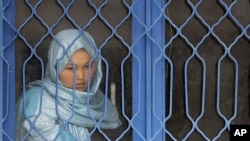Human Rights Watch says hundreds of Afghan women have been imprisoned for "moral crimes" that include running away and adultery. The report is particularly critical of President Hamid Karzai's Western-backed government, saying it has failed to fulfill its obligations under international human rights laws.
Kenneth Roth, Human Rights Watch Executive Director, says in the decade since the fall of the Taliban, Afghanistan's criminal justice system has made little progress in the way it treats women.
“Women are still very vulnerable to forced marriage, to domestic violence, to sexual abuse and when they try to do something about it the the legal system does not answer,” said Roth.
The report says nearly 400 women are in Afghan prisons for moral crimes, although that number has gone down significantly since 2010. These crimes include not only adultery, but also running away from home to get married, to flee a forced marriage or to escape domestic abuse, which is not a crime under Afghan law.
Roth says arrests have been justified under a unique interpretation of Sharia law.
“The Afghan supreme court has said that the crime of running away can be found in Sharia, but when we looked around the world no other government thinks that running away is in Sharia," said Roth. "Afghanistan stands alone in that interpretation.”
Earlier this month, President Hamid Karzai announced a blanket pardon for women imprisoned for running away from their parents. The government says it is working on identifying and releasing these women.
The report says that some women have been convicted of adultery after being raped or for leaving an abusive husband and seeking protection from a man who is not a family member. It says judges often convict on the basis of confessions given in the absence of lawyers and signed by women who cannot read nor write. Prison sentences can last in some cases more 10 years.
Women publicly convicted of moral crimes also expressed fears that after they are released, they could be murdered by their families for reasons of honor.
During the Taliban's five-year rule, women and girls were severely marginalized in all aspects of Afghan society. Women were forced to wear body-and-face covering burqas and were not allowed out of the house without a male family member as an escort.
The Afghan constitution now ensures equal rights for women and outlaws violence against women. A number of Afghan women have been elected to parliament and access to education for girls continues to grow. But Afghanistan remains a very conservative culture and women remain vulnerable to discrimination and abuse.
Human rights groups are worried, as the United States and NATO reduce their presence in Afghanistan, President Karzai will sacrifice the rights of women in peace talks with the Taliban and to appeal to more conservative elements in Afghan society.








